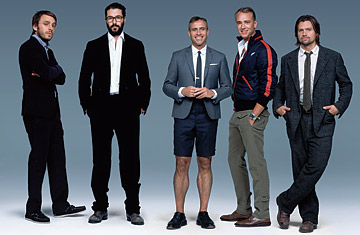
Band of Outsiders' Scott Sternberg, left, Adam Kimmel, Thom Browne, Michael Bastian and Taavo Somer of Freeman Sporting Club, all wearing their own designs.
In the late 1960s, Calvin Klein and Ralph Lauren, two outsiders from the Bronx who dreamed of making it big in the fashion industry, started their companies. Both eventually created megabrands that took American style global and defined what it means to be successful in fashion.
Klein infused his brand with an unprecedented sexuality that now dominates the marketplace. He sold his company to Phillips–Van Heusen for $400 million in 2003. Lauren introduced lifestyle branding before the concept had a name, turning his notion of American splendor into a worldwide corporation with revenues of $4.9 billion in fiscal year 2008. Not bad for two wide-eyed sons of the Bronx.
Forty years later, a new generation of American menswear designers has emerged with a collective strength not seen in decades. And while Klein and Lauren remain legendary influences, their heirs are altering the model of success that was established before them: where their predecessors thought mega, this new group thinks micro.
The designers featured on these pages are marketing their personal brands of cool, initially driven by their own sartorial needs rather than a desire for global fashion influence. Having come to fashion not from design schools but from successful careers outside the industry, they count a Hollywood veteran, an architect and a former actor among them. They began by making clothes that their equally creative friends wanted to wear, conceiving their businesses the way MySpace users create profiles, reflecting their environments and tastes.
"It's artisan vs. corporate," says Tom Kalendarian, men's fashion director at Barneys. "Think of them as tailors, not designers. Give or take a few surprises, there's a lot of predictability out there. Men are looking for the idiosyncratic."
Combining contemporary imagery with timeless ideals of masculinity, these five rising menswear stars are creating conventional clothes for the not-so-conventional modern man.